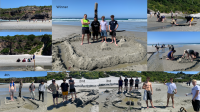Your health and safety is our number one priority so we're sharing some messaging about Measles and Meningitis to support your wellbeing.
Meningococcal disease/Meningitis and Measles are both very nasty illnesses and it’s important that you keep an eye out for yourself and your mates.
Prevention is always the best positive action you can take to help yourself and your whānau and luckily, vaccines are available. Our Student Health Centre in Dunedin offers these vaccinations (phone directly on 03 479 6082 or freephone 0800 762 786 and ask to speak with Student Health).
Keeping up healthy hygiene habits such as washing and drying your hands and covering your nose or mouth when you sneeze or cough, is also a great line of defence!
And next time you go to share that vape or drink bottle with a mate, think again - the less you share, the better your chance of staying healthy.
Meningococcal disease/Meningitis
A severe bacterial infection that can lead to two very serious illnesses: Meningitis (an infection of the brain membranes) and Septicaemia (blood poisoning).
Meningococcal can be life-threatening so it’s important that you know the signs and symptoms.
Know what to watch for
Meningococcal may develop slowly over one to two days or can develop very quickly over just a few hours. It can be treated with antibiotics so early treatment is vital.
It cannot be treated at home – it’s important to seek medical help straight away.
Sometimes a person can feel unwell and then feel better again before becoming very ill, very quickly. Trust your gut and always ring for help.
General symptoms:
- high fever
- headache
- confusion
- sleepiness
- joint and muscle pains.
Specific symptoms:
- rash (a rash consisting of reddish-purple pin-prick spots or bruises, that don’t disappear when you press on them with a glass)
- a stiff neck
- dislike of bright lights
- vomiting
Act quickly!
If you or one of your whānau, mates or flat mates, have symptoms like any of the above, act fast.
- Ring your doctor, or
- Freephone Healthline 0800 611 116 (24 hours, 7 days), or
- Call 111 and ask for an ambulance if you need emergency medical help.
Even if a person has been checked by a doctor, keep an eye on them. If they get worse, go to the hospital. Tell medical staff if the person who is ill is already taking antibiotics as these may mask symptoms.
Protect yourself
Teenagers and young adults living closely together are at higher risk than others of catching Meningococcal but there are vaccines available to protect against it.
1. Bexsero
Bexsero is recommended and funded for young adults 13-25 years old entering within the next three months, or currently in their first year of specified close living situations.
2. MenQuadfi
MenQuadfi is recommended and funded from 12* months of age for adolescents and young adults aged 13-25 years old who are entering within the next three months, or in their first year of living in a boarding school hostel, tertiary education halls of residence, military barrack or prison.
For more info about getting immunised:
- talk to your doctor
- freephone Healthline on 0800 611 116 (24 hours, 7 days a week)
- visit www.health.govt.nz/meningococcal
Measles
Measles is a highly contagious disease caused by a virus that can be life-threatening. Up to 30% of people with measles will develop complications and some will need to be admitted to hospital.
Know what to watch for
The illness starts around 10 days after you’ve been exposed but the range can be 7 – 13 days.
First symptoms:
- a fever
- a cough
- a runny nose
- sore and watery ‘pink’ eyes.
Next symptoms:
- a blotchy rash which tends to start on the face, behind the ears, before moving down the body (lasts for up to a week).
Act quickly!
If you think that you or any of your mates or whānau have measles symptoms:
- Ring your doctor, or
- Freephone Healthline 0800 611 116 (24 hours, 7 days).
IMPORTANT: You need to call before visiting the doctor to stop the spread of measles.
If someone is diagnosed with measles, they need to isolate at home for four days after the rash develops to prevent transmission to others.
Protect yourself
Anyone can develop measles and the best preventative protection is the measles, mumps and rubella (MMR) vaccine.
The MMR vaccine is given as part of the National Immunisation Schedule.
Two doses are recommended and funded for non-immune children and adults.
For more info about getting immunised:
- talk to your doctor
- freephone Healthline on 0800 611 116 (24 hours, 7 days a week)
- visit https://www.health.govt.nz/your-health/conditions-and-treatments/diseases-and-illnesses/measles
Getting support
If you need support in any way, please reach out to our support team. It’s what they’re here for.
- Email studentsuccessdn@op.ac.nz
- Freephone 0800 762 786
Published on 4 Mar 2024
Orderdate: 4 Mar 2024
Expiry: 4 Mar 2026





